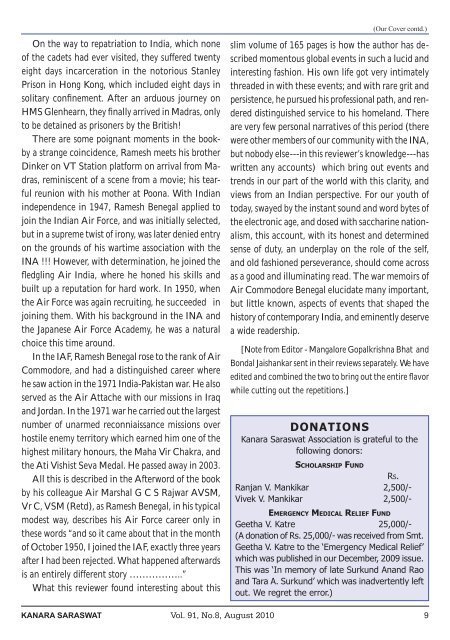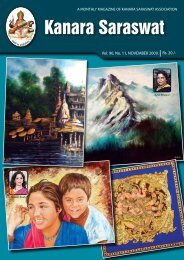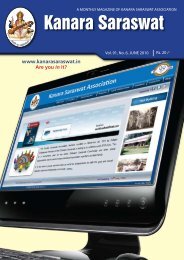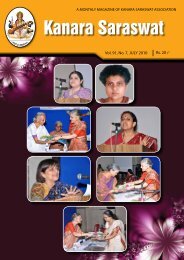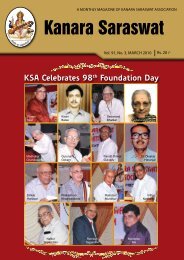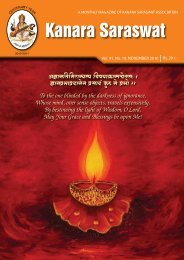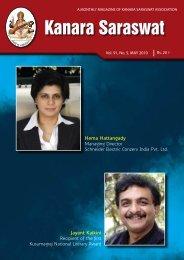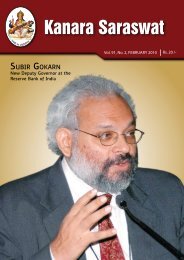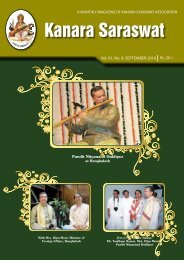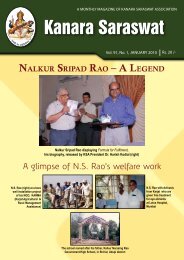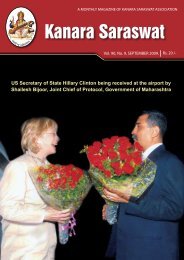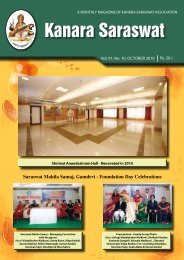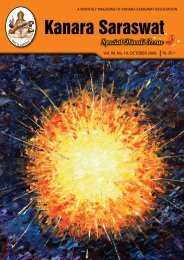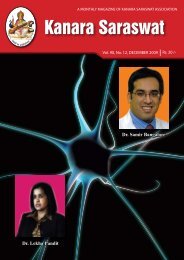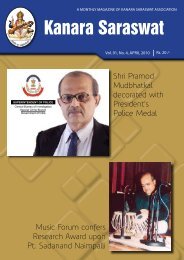You also want an ePaper? Increase the reach of your titles
YUMPU automatically turns print PDFs into web optimized ePapers that Google loves.
On the way to repatriation to India, which none<br />
<strong>of</strong> the cadets had ever visited, they suffered twenty<br />
eight days incarceration in the notorious Stanley<br />
Prison in Hong Kong, which included eight days in<br />
solitary confi nement. After an arduous journey on<br />
HMS Glenhearn, they fi nally arrived in Madras, only<br />
to be detained as prisoners by the British!<br />
There are some poignant moments in the book-<br />
by a strange coincidence, Ramesh meets his brother<br />
Dinker on VT Station platform on arrival from Madras,<br />
reminiscent <strong>of</strong> a scene from a movie; his tearful<br />
reunion with his mother at Poona. With Indian<br />
independence in 1947, Ramesh Benegal applied to<br />
join the Indian Air Force, and was initially selected,<br />
but in a supreme twist <strong>of</strong> irony, was later denied entry<br />
on the grounds <strong>of</strong> his wartime association with the<br />
INA !!! However, with determination, he joined the<br />
fl edgling Air India, where he honed his skills and<br />
built up a reputation for hard work. In 1950, when<br />
the Air Force was again recruiting, he succeeded in<br />
joining them. With his background in the INA and<br />
the Japanese Air Force Academy, he was a natural<br />
choice this time around.<br />
In the IAF, Ramesh Benegal rose to the rank <strong>of</strong> Air<br />
Commodore, and had a distinguished career where<br />
he saw action in the 1971 India-Pakistan war. He also<br />
served as the Air Attache with our missions in Iraq<br />
and Jordan. In the 1971 war he carried out the largest<br />
number <strong>of</strong> unarmed reconniaissance missions over<br />
hostile enemy territory which earned him one <strong>of</strong> the<br />
highest military honours, the Maha Vir Chakra, and<br />
the Ati Vishist Seva Medal. He passed away in 2003.<br />
All this is described in the Afterword <strong>of</strong> the book<br />
by his colleague Air Marshal G C S Rajwar AVSM,<br />
Vr C, VSM (Retd), as Ramesh Benegal, in his typical<br />
modest way, describes his Air Force career only in<br />
these words “and so it came about that in the month<br />
<strong>of</strong> October 1950, I joined the IAF, exactly three years<br />
after I had been rejected. What happened afterwards<br />
is an entirely different story ……………..”<br />
What this reviewer found interesting about this<br />
slim volume <strong>of</strong> 165 pages is how the author has described<br />
momentous global events in such a lucid and<br />
interesting fashion. His own life got very intimately<br />
threaded in with these events; and with rare grit and<br />
persistence, he pursued his pr<strong>of</strong>essional path, and rendered<br />
distinguished service to his homeland. There<br />
are very few personal narratives <strong>of</strong> this period (there<br />
were other members <strong>of</strong> our community with the INA,<br />
but nobody else---in this reviewer’s knowledge---has<br />
written any accounts) which bring out events and<br />
trends in our part <strong>of</strong> the world with this clarity, and<br />
views from an Indian perspective. For our youth <strong>of</strong><br />
today, swayed by the instant sound and word bytes <strong>of</strong><br />
the electronic age, and dosed with saccharine nationalism,<br />
this account, with its honest and determined<br />
sense <strong>of</strong> duty, an underplay on the role <strong>of</strong> the self,<br />
and old fashioned perseverance, should come across<br />
as a good and illuminating read. The war memoirs <strong>of</strong><br />
Air Commodore Benegal elucidate many important,<br />
but little known, aspects <strong>of</strong> events that shaped the<br />
history <strong>of</strong> contemporary India, and eminently deserve<br />
a wide readership.<br />
[Note from Editor - Mangalore Gopalkrishna Bhat and<br />
Bondal Jaishankar sent in their reviews separately. We have<br />
edited and combined the two to bring out the entire fl avor<br />
while cutting out the repetitions.]<br />
DONATIONS<br />
Kanara Saraswat Association is grateful to the<br />
following donors:<br />
SCHOLARSHIP FUND<br />
(Our Cover contd.)<br />
RS.<br />
Ranjan V. Mankikar 2,500/-<br />
Vivek V. Mankikar 2,500/-<br />
EMERGENCY MEDICAL RELIEF FUND<br />
Geetha V. Katre 25,000/-<br />
(A donation <strong>of</strong> Rs. 25,000/- was received from Smt.<br />
Geetha V. Katre to the ‘Emergency Medical Relief’<br />
which was published in our December, 2009 issue.<br />
This was ‘In memory <strong>of</strong> late Surkund Anand Rao<br />
and Tara A. Surkund’ which was inadvertently left<br />
out. We regret the error.)<br />
KANARA SARASWAT Vol. 91, No.8, <strong>August</strong> <strong>2010</strong> 9


